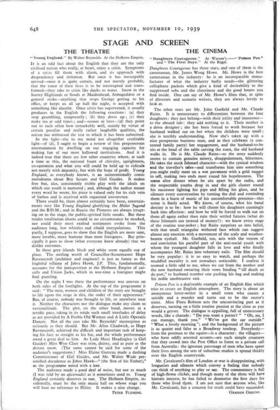THE CINEMA
" Daughters Courageous." At • Warner's.—" Poison Pen " and " The First Days." At the Regal.
Daughters Courageous has three stars, and one of them is the cameraman, Mr. James Wong Howe. Mr. Howe is the best cameraman in the industry : he is an incomparable manu- facturer of what the industry badly needs—the glittering cellophane packets which give a kind of desirability to the suppressed sobs and the cheeriness and the good hearts you find inside. One can say of Mr. Howe's films that, in spite of directors and scenario writers, they are always lovely to look at.
The other stars are Mr. John Garfield and Mr. Claude Rains. It is unnecessary to differentiate between the four daughters : they just belong—with their jollity and innocence— to the absurd tale: they add nothing to it. Their mother is a dress designer ; she has been forced to work because her husband walked out on her when the children were small ; she is terribly understanding. Now she's taken up with a nice prosperous business man, and as they celebrate (a con- tented family party) her engagement, and the husband-to-be sits at the head of the table carving the roast, the old husband walks in. He is Mr. Claude Rains—so the story suddenly seems to contain genuine misery, disappointment, bitterness. He takes the stock Ishmael character—with the cynical wisdom and the traveller's tales—and transforms him into something you might really meet on a wet pavement with a gold nugget to sell, making two ends meet round his hopelessness. The scene after dinner when he sits apart by the radio, and the respectable youths drop in and the girls duster round his successor lighting his pipe and filling his glass, and he silences every conversation by turning the dial and reminding them in a burst of music of his uncomfortable presence—this scene is finely acted. We know, of course, what his banal destiny is to be : how he will charm his daughters cunningly back into affection: and how he will be forced to walk out on them all again rather than ruin their settled futures (what do these Ishmaels use instead of money?): we know every stage of the routine tear-jerker ; but Rains surprises us into belief, with that small triangular withered face which can suggest almost any emotion with a movement of the scaly and weather- beaten eyeball. Mr. Garfield, too, acts with the venom of real conviction his parallel part of the anti-social youth with whom the youngest daughter falls in love and who finally accompanies Mr. Rains into voluntary exile. The film should be very popular : it is so easy to watch, and perhaps the muddled morality is not nowadays noticeable. I confess it seemed a little odd to me, when we cut from the mother and the new husband swearing their vows binding " till death us do part," to husband number one packing his bag and making his noble unobtrusive exit.
Poison Pen is a deplorable example of an English film which tries to create an English atmosphere. The story is about an anonymous letter-writer in a small town who causes a suicide and a murder and turns out to be the rector's sister. Miss Flora Robson acts the unconvincing part as it deserves, turning on whittle routine passion at the close as you would a geyser. The dialogue is appalling, full of unnecessary words, like a charade: " Do you want a porter? " " Oh, no, I can manage, thank you." " We've got the car outside." " What a lovely morning "; and the background of the picture is as quaint and false as a Broadway teashop. Everybody— from the postman to the squire—is a character : the villagers— who have oddly assorted accents—are such simple creatures that they crowd into the Post Office to listen to a private call from Australia : the ignorant patronage of men who have spent their lives among the sets of suburban studios is spread thickly over the English countryside.
Mr. Cavalcanti's film of London at war is disappointing, with longueurs and silences which convey a feeling that nobody can think of anything to play or say. The commentary is full of high-flown clichis, and though many of the shots will have historic interest, he has failed to dramatise the first days for those who lived them. I am not sure that anyone who, like Mr. Cavalcanti, has a concern for truth could have succeeded.
GRAHAM GREENE.




































 Previous page
Previous page